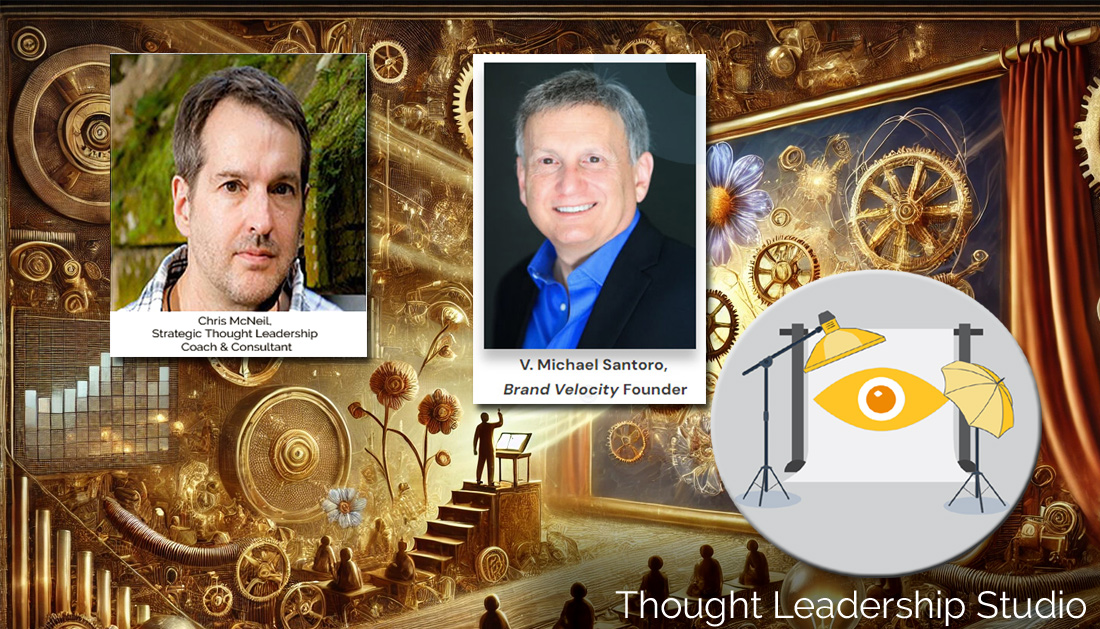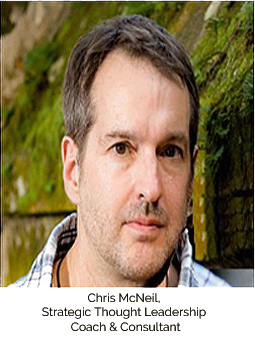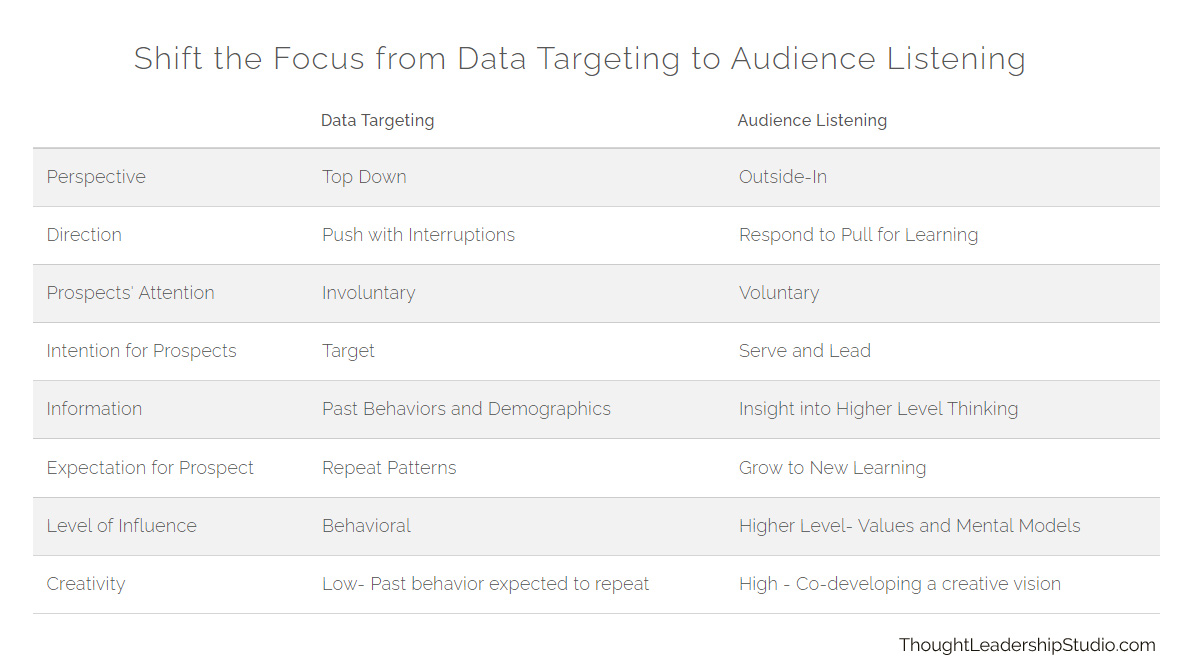Thought Leadership Studio Podcast Episodes:
The Audience Effect
Episode 84 - Shifting from Data Targeting to Audience Connection: Building Authentic Influence through Strategic Thought Leadership Content

#branding, #communication, #contentmarketing, #digitalnomads, #influence, #innovation, #marketing, #marketingstrategy, #paradigmchange, #paradigmshifts, #personalbranding, #persuasion, #seo, #socialmedia, #speaking, #storytelling, #strategicthoughtleadership, #systemsthinking, #thoughtleadership, #thoughtleadershipmarketing, #workshop
Or Click here to listen or subscribe on appWhat this episode will do for you
:- Understanding The Audience Effect: Explore the concept of The Audience Effect and how it shifts the focus of marketing from data targeting to audience engagement and education.
- Balancing Conformity and Originality in Content: Learn how to create content that aligns with what search engines expect while bringing fresh, unique perspectives that differentiate your brand.
- Empathy in Online Branding: Discover the role of empathy in building an authentic online brand, focusing on the real people behind the data points.
- Thought Leadership SEO Matrix: Uncover the importance of blending topical authority with thought leadership to guide your audience’s thinking and build long-term trust.
- Transforming Your Digital Presence: Gain insights into how to build a digital presence that serves as an online asset, drawing in an audience through valuable, consistent content.
- From Transactional to Transformational Marketing: Find out how giving away knowledge and empowering your audience fosters trust, moving your brand from mere transactions to meaningful connections.
The Audience Effect
In this episode, I'm excited to bring you a deep dive into "The Audience Effect" with my friend and collaborator, V. Michael Santoro.
How is The Audience Effect relevant to Strategic Thought Leadership (STL)?
Strategic Thought Leadership is about creating models that authentically influence and that are aligned with your audience’s needs and aspirations. The Audience Effect happens when people engage repeatedly with your content, fostering genuine connections, without a need for interruptive marketing tactics.
V. Michael Santoro, also known as Vito, is an expert in SEO, a business strategist, and co-founder of Brand Velocity. With extensive experience helping brands establish strong online presences, Vito believes that successful online branding goes beyond data targeting—it’s about delivering value and building long-term relationships through content that educates and inspires.
In our conversation, Vito and I explore how to integrate SEO with thought leadership to cultivate an audience-centered approach that resonates in today’s digital landscape. We discuss the importance of authentic branding, establishing topical authority, and using content to lead your audience to new perspectives.
This episode offers practical insights into leveraging The Audience Effect to grow your brand and connect more deeply with your audience, featuring strategies to transform your online presence into a trusted, empowering resource.
Some relevant coordinates:
Curated Transcript of Conversation between Chris McNeil and V. Michael Santoro about The Audience Effect
The following partial transcript is lightly edited for clarity - the full conversation is on audio. Click here to listen.
 Chris McNeil: I'm Chris McNeil, with Thought Leadership Studio, and I'm sitting across Zoom with my friend and counterpart in the Thought Leadership SEO program, V. Michael Santoro, also known as Vito. Great to have you here, Vito..
Chris McNeil: I'm Chris McNeil, with Thought Leadership Studio, and I'm sitting across Zoom with my friend and counterpart in the Thought Leadership SEO program, V. Michael Santoro, also known as Vito. Great to have you here, Vito..
Beyond Data Targeting: Embracing The Audience Effect in Strategic Internet Marketing
 V. Michael Santoro: Thanks for the invitation. I always look forward to working with you and coming up with new ideas.
V. Michael Santoro: Thanks for the invitation. I always look forward to working with you and coming up with new ideas.
Chris McNeil: And this is, to the listener, this is going to be a different kind of podcast in that I've had workshop-type podcasts where I'm solo teaching an aspect of strategic thought leadership, aiming to be really empowering, or bringing on a guest as a model of excellence. And Vito, or V. Michael has been a guest before. We've talked about his book, Rite of Passage, and his journey in SEO and entrepreneurship and helping other entrepreneurs see it as the mental game that it is.
But today we're here to talk about a concept called The Audience Effect. And it just seems that this type of collaborative conversation between peers is a good way to convey a concept that can eliminate the frustration of what happens when we try to do internet marketing and communication. With the dominant paradigm of data targeting, The data targeting is about pushing with interruptions.
The Audience Effect is about responding to people's desire to use the internet for learning. So we're dealing with voluntary instead of involuntary attention. We're dealing with serving and leading an audience instead of targeting people. We're being, in the words of a recent guest, on the podcast, Kim Willis, we're looking to be more farmers and less hunters for our audience. And really build an audience that way, because it just seems rare that people build an engaged audience online.
 And Vito and I have been involved in a program called Thought Leadership SEO to recognize the synergy between organic amplification that's respectful of the end user and the Strategic Thought Leadership that builds content. And it is really empowering - that people will want to find and want to engage with, and it can lead to building an audience. But what are your thoughts, Vito, on where we're at these days with how people use the internet to learn about products and services being bought or sold online, and how people typically use the internet to market themselves, and where they fall short normally?
And Vito and I have been involved in a program called Thought Leadership SEO to recognize the synergy between organic amplification that's respectful of the end user and the Strategic Thought Leadership that builds content. And it is really empowering - that people will want to find and want to engage with, and it can lead to building an audience. But what are your thoughts, Vito, on where we're at these days with how people use the internet to learn about products and services being bought or sold online, and how people typically use the internet to market themselves, and where they fall short normally?
V. Michael Santoro: That's an interesting question, because I think we're transitioning from the old model of search engines to the new model that includes artificial intelligence. And what happens when you get a new tool, people press the easy button because they're not that thrilled about marketing, and they want to do what they do.
If they're a coach or a business owner, they want to concentrate on that. But without marketing, they're not going to fill their pipeline with sales. So it's a vicious circle. When you throw everything against The wall, whether AI makes it easier or you're doing it yourself, you're becoming part of what Google refers to as the noise.
And the noise is all the junk out there. It's like a carnival. Like if you walked into a carnival and you saw all the vendors, they're all screaming at you, step right up, come in. That's what you're a part of. If you don't have any way to differentiate yourself and understand how amplification works in order to build both authority and trust with Google and your potential customers.
Dominant Paradigms in Marketing and the Quest for Authentic Online Engagement
Chris McNeil: Yeah, great point. So we've had discussions before about how people just try to copy the content, this leading content. And as far as what people discover through search engines, and this can apply to social media as well. If you're just putting out there what's already out there, what's the incentive for this to rise to the top? It has to lead people to something new.
V. Michael Santoro: That's correct.
Chris McNeil: And, but I have recently talked about my wife and her work at a local college and how they had two programs for training social media people and they're free programs. So the college is interested in this, so we don't have to pay for this. One was provided by Google and one was provided by Facebook. Now these are two big players who've gotten rich off of targeted marketing that interrupts people's stream of consciousness and instead of letting them find stuff they want to find, it interrupts that with a sales offer that isn't.
It's worked great for them, but not as much so for people using these services, but of course through whatever course they teach, they're going to perpetuate this this dominant paradigm of what you do on the internet is you use data to target people. What are your thoughts on that Vito?
V. Michael Santoro: Well, if you look at Google and you look at Facebook, there are two different models for advertising. And with Facebook, it's very demographics-oriented. What magazines do you read? What's your location? While Google does that too, Google is more keyword based. So if someone's typing in to get some help on a particular topic, they're already interested in doing a targeted search. That's why Google did so well. With the search engines, because if I'm interested, I may on Facebook, I may not be interested in what you're selling, but I need to be interrupted.
 Like you mentioned, it's CNN that triggers an interest so that now I can go to a landing page where in Google, if I'm interested in a topic, I'm typing in the keyword and only the ads associated with that keyword are shown. Plus, you get organic results, which means you might find an article or whatever. And that's why Google did so well, because it was more targeted and had better traffic, right? The problem is now, like you mentioned earlier, with all the junk content, Google isn't even indexing pages anymore because it's so overwhelmed with the amount of content because of the AI, like ChatGPT and the like.
Like you mentioned, it's CNN that triggers an interest so that now I can go to a landing page where in Google, if I'm interested in a topic, I'm typing in the keyword and only the ads associated with that keyword are shown. Plus, you get organic results, which means you might find an article or whatever. And that's why Google did so well, because it was more targeted and had better traffic, right? The problem is now, like you mentioned earlier, with all the junk content, Google isn't even indexing pages anymore because it's so overwhelmed with the amount of content because of the AI, like ChatGPT and the like.
So the trick is, is to build a foundation online, which is called your entity, and build your brand to the point where you become, okay, a de facto de facto authority in your niche through the content, but it can't be what everyone else is saying. Google wants and I know this sounds a little like an oxymoron but they want conformity plus originality and the conformity.
They want the structure of the content correctly because they're an algorithm. They need to understand what you're doing so they could rank you, but then they want the originality built into the conformed structure so that you differentiate And now they start when they trust your brand, you get better search engine rankings But if you're doing what everyone else is doing it's not going to work no longer Even long tail keywords like a lot of SEOs concentrate. Even those are getting incredibly competitive because everybody's panicked in the old model trying to get ranked.
Pace and Lead: Blending SEO with Thought Leadership for Lasting Influence
Chris McNeil: And there's this thing about trying to get ranked and we've talked before about combining SEO and thought leadership. It is kind of a pace and lead model. You pace, you match what people are searching for. You match their interest, but then you lead their thinking to your fresh perspective that adds value. And this is part of the seed of what can become the audience of that.
Because if your content leads value, and you're talking about becoming an authority, we've had discussions before around the concept of creating an online learning center so that not only you have the found. You once they've found you, they want to stay there, whether that's through a podcast or a video channel or a blog or a social media presence that has a learning and empowerment component with regular posting like a LinkedIn newsletter. But some something that provides a rhythm of fresh empowerment that aligns with what people want to learn about any given field or profession.
V. Michael Santoro: Yeah.
Chris McNeil: people are online researching about this - depending on what study you look at, 81 to 89% of people research online before a major purchase, even an offline purchase, people spend six to seven hours a day on average online.
 A lot of this is in that research, but organizations miss the opportunity for this audience effect because they're concerned with using data to target people. Expecting them. And they’re looking at this long line out the cookie shop to borrow the metaphor from Woody Allen’s movie, Small Time Crooks, where they’re trying to drill on the ground to a bank and they’re not even paying attention to the front business, a cookie shop that has a line two miles long through the city because they’re so popular and the cookies are making a ton of money and they don’t see it because they’re underground trying to drill to the bank.
A lot of this is in that research, but organizations miss the opportunity for this audience effect because they're concerned with using data to target people. Expecting them. And they’re looking at this long line out the cookie shop to borrow the metaphor from Woody Allen’s movie, Small Time Crooks, where they’re trying to drill on the ground to a bank and they’re not even paying attention to the front business, a cookie shop that has a line two miles long through the city because they’re so popular and the cookies are making a ton of money and they don’t see it because they’re underground trying to drill to the bank.
And people are looking at all these statistics that reduce people to data points. With data targeting, they missed the long line out the door of people doing this kind of online research or social media can become a channel to create this engagement as well as organic search. What are your thoughts on that, Vito?
V. Michael Santoro: Again, I think we’re in a transition mode because it’s a vicious cycle. If you can’t get in front of people, you’re not going to be able to sell them. But if you're in front of people without a good message or, you know, offering anything of value, you're not going to convert them. It's a; it really is a vicious cycle that's in transition right now.
But what I found is the more authentic you are in wanting to help people, you know, think about it. If you had a brick and mortar business and somebody walked into your store, would you treat them the same way as you treat them on your website? OK; And, you know, that's like an aha moment, right? Like when you create content, you have to figure if a friend came to you with a question and they really needed help and you were an expert. Would you be just writing some general stuff and throwing it at them? Or would you take some time to really answer the question?
Because user intent is becoming incredibly important with content on Google. If you're not addressing user intent, you're not going to rank. And if you're not helping people, you're not going to rank. They've actually got their algorithm triggered to to look for this stuff. Right. So you have to know what you're doing. But write like you're talking to somebody who you who you care about. Because the more you do that, the more authenticity you're going to have, the more helpful content you provide. You're going to be fun. Think of it.
You're becoming an education company that happens to be a coach in health care or whatever it is, but education is the true way to build your brand and market online. All right. And it's all topical authority. If you don't achieve expertise or communicate your expertise in a topic, you're no longer going to be a player. That's just the way it's going.
The Thought Leadership SEO Matrix: Mapping Empathy to Lead New Thinking
Chris McNeil: . And we've talked about even extending the high-end search engine optimization tool, the topical authority map that guides to content is something called a thought leadership SEO matrix that takes the topical authority map as the baseline thinking position, but then to add thought leadership positions and talking points as the new thinking, leading. Yeah. So here's a typical example here. There was there was a group of 20. You know, it's because they already know what they're doing. Even if which is sounding that a little debatable, But you know, you're bad progress. It happens. It situation is bad?.. trust through content takes time. It takes a rhythm. It takes being present.
 And the big distinction that you reminded me of Vito, when you're talking about that, having those natural conversations with people. So it comes across as authentic. It reminded me of the study I've done of some of the top 1% of people who are effective in marketing on social media. And I'm talking people I've interviewed like Samantha Kelly and Evan Kirstel. They're doing things differently. They don't see the computer screen of things to do with social media. They see the person on the other side.
And the big distinction that you reminded me of Vito, when you're talking about that, having those natural conversations with people. So it comes across as authentic. It reminded me of the study I've done of some of the top 1% of people who are effective in marketing on social media. And I'm talking people I've interviewed like Samantha Kelly and Evan Kirstel. They're doing things differently. They don't see the computer screen of things to do with social media. They see the person on the other side.
V. Michael Santoro: Exactly.
Chris McNeil: Samantha said, 'I see myself in them. And I want to be there to help them." And to me, that correlates with back in the old days when we're doing NLP-based phone training and watching people's results go through the roof and phone conversions. Found the big distinction of people who are successful is they had a mental image of the person they were talking to, even if they have never met them. So you got to see the person on the other side and you have to have empathy based.
Building an audience is built around empathy. You don't really care about the kinds of problems you're having. We've discovered this market segment or niche has systemic issues that have created systemic problems that a lot of you have. We have built solutions to lead you. To a new vision of solving these issues in an innovative way that can make things work a lot better for you and build this model around it.
Let me lead you to this through our content in an empathic way, in a way that helps you feel better about what you're doing. It gives you hope. It gives you confidence. It gives you surety in a way that you wouldn't get from people just regurgitating the parrot content, which is most of what's online these days.
V. Michael Santoro: Well said.
Chris McNeil: Oh, thanks. I'm actually looking at a table that contrasts the data targeting dominant paradigm. And we talked a little bit about Google. Google is kind of a mix because Google has; it became the dominant player for organic search with their link-based model where every inbound link was a vote that the content is good. So it became a good way for people to quickly find helpful information, but they also have paid placement.
 V. Michael Santoro: That's right.
V. Michael Santoro: That's right.
Chris McNeil: ... that way- which is fine. But if you're just depending on paid placement without a strong organic presence, that's correct. Then if you don't have your organic presence down, you can waste a lot of money with paid placement because people find your presence and it's hollow. And Vito, I know you promote this online branding approach. Do you want to talk a little bit about what makes an authentic online brand?
Giving Away Knowledge to Gain Authority: The New Rules of Online Branding
V. Michael Santoro: Yeah. If you, what's called an entity, that's - think of it, everything that's ever said to you, you want the internet. It's all Google keeps track of all of that. And the stronger that is, the better you're going to rank. The problem that people don't understand is the advertising scene. It's expensive, but they figure it's easier. They're getting in front of people.
People in 2024 became very smarter than they used to be 10 years ago online. So even if they see your ad, they're going to check you out. Like you just mentioned, they're going to look at your competitors. And if you don't, if you look like your cookie-cutter, like everyone else, you might have a couple of social media places that are kind of dated, or you're putting junk up like 'happy birthday' and stuff without any meaningful content. And you're, you have a website that hasn't been updated or you don't have any presence. You're not going to do well. People can see right through that. Right. But if you look at it, getting back a little of what you said, that the topical map that, that, which is the conformity side is your, all the topics you need to, be talking about, about what Google feels is important for your niche.
The more you address that, the more your authority is increased. However, that the thought leadership part is on the originality, which is what they're looking for. So by integrating the two, you become that leader that people want to know that what you have to say, because you're sharing information that they don't see common. Most people it's the model's becoming where it used to be. You wanted to sell your information because it was an information-based economy.
 Now you have to give the information away in order to build your, your, your authority and trust so that you can convert people into customers. And when you have a great Google presence and you've got all this wonderful content that you're going to, you're going to have an incredible pipeline. And what you're doing is you're building an asset. If you have all this digital presence, you're going to have an asset. And online, you decide you have a company you want to sell that brand is such valuable as Google rewards, Google grants organic rankings.
Now you have to give the information away in order to build your, your, your authority and trust so that you can convert people into customers. And when you have a great Google presence and you've got all this wonderful content that you're going to, you're going to have an incredible pipeline. And what you're doing is you're building an asset. If you have all this digital presence, you're going to have an asset. And online, you decide you have a company you want to sell that brand is such valuable as Google rewards, Google grants organic rankings.
Chris McNeil: Absolutely. And it seems so common sense when we talk about it this way, but it's obviously some major prevalent belief systems that keep people from engaging in this. And one of them is just fear of giving your knowledge away and people hold back as a result. Then their competitor does a better job of engaging people - if they're not holding back - on sharing whatever empowering expertise.
And even if you're a coach or consultant, if you share everything, you know, it's going to empower people. And some people may be able to DIY to a degree, but it's going to raise your value as people experience your value through the empowerment that it gives them.
V. Michael Santoro: What I found, especially on the, the SEO and content application I'm very open about what to do. Here's what you need to do, right? People who don't have an expertise there, they want to know that, you know, what you're doing. That's what the edge, that's what the content is doing. You're not giving away trade secrets, right?
You're giving away how to do things, right? And when you do that, you're, you're building your authority in their mind because they're saying, I don't want to do this, but I want to work with the best. And I want to work with somebody who's more of a partner. Than a vendor.
That's what you're communicating through all your education and people, anybody who needs to hide something stopped learning a thousand years ago. That's the way I look at it every day. It changes. I don't care what niche you're in. It changes. And good people want to know that you're providing information that can help them. But most people don't want to do it themselves if it's not their expertise.
Chris McNeil: Well, and it's just demonstrating the servant's heart. Even if you're an audience member who never buys from me, I care about helping you. And to those who are listening to this thinking, well, am I not reducing my income by giving my service away? I would point to the example of the preeminent first viral marketers, the Grateful Dead, who, while other bands in the 1970s and 80s forbid people who were coming to their shows from taping their shows ... they welcomed it and basically said, tape the shows, do whatever you want with them. Just don't try to make money from it
And it created a whole taper economy before the internet, that drove their value of their shows, brought more people to their shows, created new fans. And one time they were earning more per year than Michael Jackson, like 24, 25 million a year, which is probably 70 million a year now, just touring, just touring on fans built from this kind of, viral marketing where people are sharing stuff they gave away for free that their other bands were not letting people do because they were fearful about letting people tape something because they might lose some money.
Isn't that crazy?
***************************************
The transcript is lightly edited for clarity and is a partial transcript- the full interview is on audio. Click here to listen.
***************************************
Free Stuff and Offers Mentioned in Podcast
***************************************
***************************************